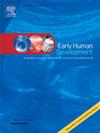Implementation of nutritional care bundle is associated with improved growth in preterm infants born before 32 gestational weeks
IF 2.2
3区 医学
Q2 OBSTETRICS & GYNECOLOGY
引用次数: 0
Abstract
Objective
To evaluate whether implementing a nutritional care bundle is associated with growth and morbidity in very preterm (VPT) infants.
Study design
This study compared 87 VPT infants (<32 gestational weeks) born 2018 (Before group) with 75 infants born 2020 (After group), treated at a single center in the Czech Republic. A nutritional care bundle was implemented during 2019.
Results
Median gestational age (weeks) was 30.0 [IQR 27.6–31.1] for the Before group and 29.9 [IQR 27.9–30.6] for the After group. During postnatal days 1–14, parenteral fluid intake was significantly lower in the After group compared to the Before group and conversely for enteral fluid intake. Infants in the After group achieved full enteral feeds by postnatal day 14 (72.9 % vs. Before group 51.9 %). Weight z-scores decreased significantly less from birth to 36 weeks postmenstrual age in the After group (−0.8 [IQR −1.3 to −0.5]) compared to the Before group (−1.5 [IQR −2.0 to −1.2]). Head circumference z-scores decreased significantly less in the After group (−0.8±0.9) than the Before group (−1.6±1.1). Decreased rate of patent ductus arteriosus (PDA) requiring treatment was observed in the After group (P < 0.001).
Conclusions
Implementation of a nutritional care bundle in VPT infants was associated with improved postnatal growth and may reduce treatment-requiring PDA.
营养护理捆绑包的实施与 32 孕周前早产儿的生长发育改善有关。
目的:评估营养护理包的实施是否与极早产儿(VPT)的生长和发病率有关:评估营养护理包的实施是否与早产儿(VPT)的生长和发病率有关:研究设计:本研究比较了 87 名 VPT 婴儿(结果:中位胎龄(周)为 30.0 [IQ 值为 30.0] [IQ 值为 30.0] :研究前组的中位胎龄(周)为 30.0 [IQR 27.6-31.1],研究后组的中位胎龄(周)为 29.9 [IQR 27.9-30.6]。在出生后第 1-14 天,"试验后 "组的肠外液体摄入量明显低于 "试验前 "组,而肠内液体摄入量则相反。出生后第 14 天,出生后组婴儿实现了完全肠内喂养(72.9% 对出生前组 51.9%)。与出生前组(-1.5 [IQR -2.0至-1.2])相比,出生后组婴儿在出生后至月龄后36周的体重Z值下降幅度明显较小(-0.8 [IQR-1.3至-0.5])。术后组头围 Z 值的降幅(-0.8±0.9)明显低于术前组(-1.6±1.1)。观察到 "术后 "组需要治疗的动脉导管未闭(PDA)发生率降低(P对 VPT 婴儿实施营养护理捆绑包可改善其产后生长,并可减少需要治疗的 PDA。
本文章由计算机程序翻译,如有差异,请以英文原文为准。
求助全文
约1分钟内获得全文
求助全文
来源期刊

Early human development
医学-妇产科学
CiteScore
4.40
自引率
4.00%
发文量
100
审稿时长
46 days
期刊介绍:
Established as an authoritative, highly cited voice on early human development, Early Human Development provides a unique opportunity for researchers and clinicians to bridge the communication gap between disciplines. Creating a forum for the productive exchange of ideas concerning early human growth and development, the journal publishes original research and clinical papers with particular emphasis on the continuum between fetal life and the perinatal period; aspects of postnatal growth influenced by early events; and the safeguarding of the quality of human survival.
The first comprehensive and interdisciplinary journal in this area of growing importance, Early Human Development offers pertinent contributions to the following subject areas:
Fetology; perinatology; pediatrics; growth and development; obstetrics; reproduction and fertility; epidemiology; behavioural sciences; nutrition and metabolism; teratology; neurology; brain biology; developmental psychology and screening.
 求助内容:
求助内容: 应助结果提醒方式:
应助结果提醒方式:


